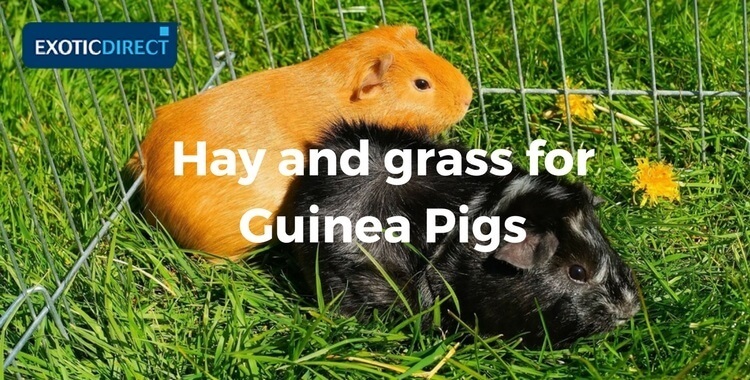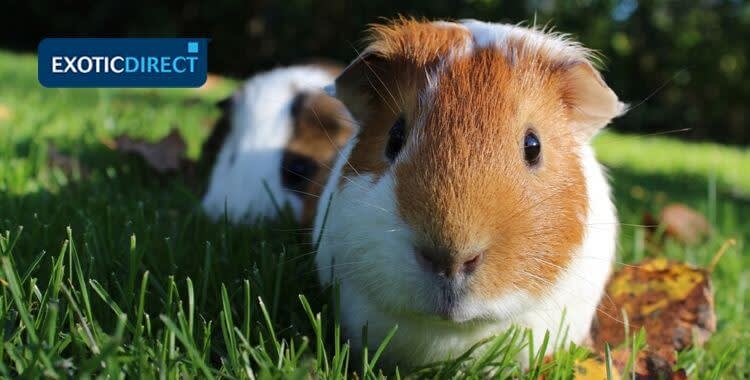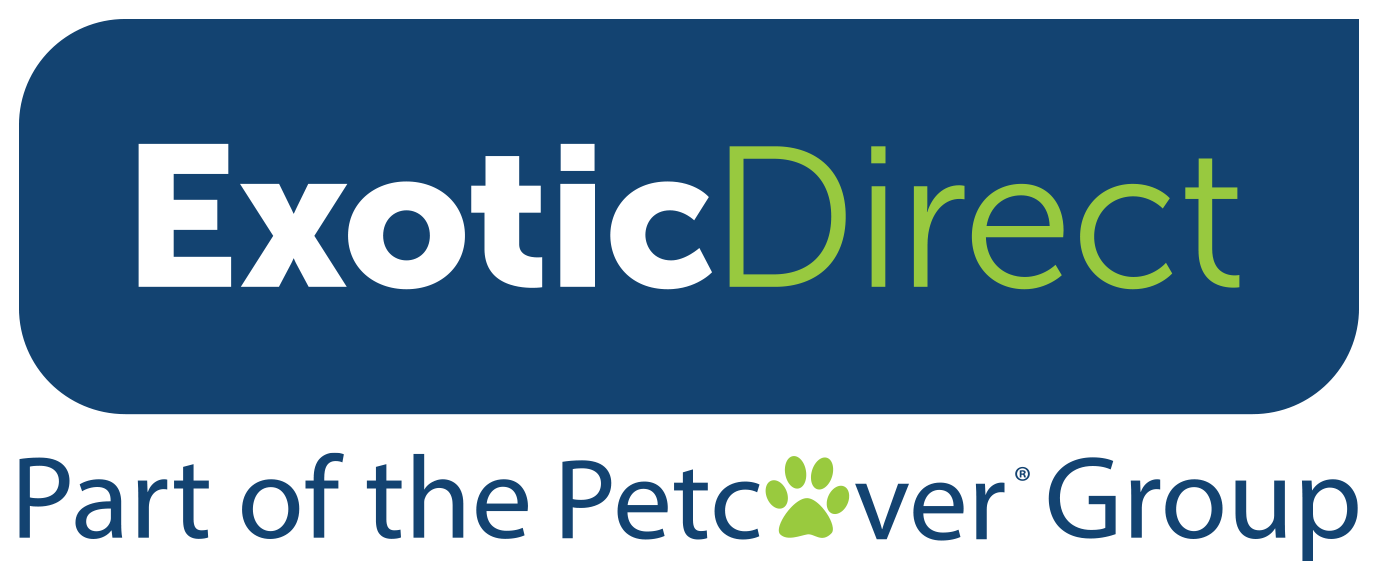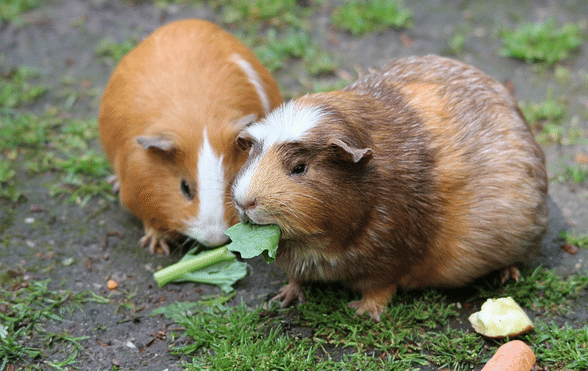Hay and grass should make up the majority of your Guinea Pig’s diet. You can also feed small portions of vegetables and it’s essential to include plenty of vitamin C. Read our list of what hay, veg and fruit you can feed, as well as what you can’t.
Is your Guinea Pig insured? Get a quote for up to £2,000 of vet fee cover | Insure up to 3 pets per policy | We’ve been insuring exotic pets since 1996 | Check out our customer reviews on Feefo.
What type of hay is best for Guinea Pigs?
Hay and grass should make up the majority of your piggy’s diet.
As a baby (or pup) Alfalfa hay is best for your Guinea Pig because it contains more calcium.
However, as your Guinea Pig grows you should switch to a hay with a lower calcium content. Too much calcium can lead to problems like bladder stones.
Timothy hay is best for your Guinea Pig as an adult. It’s got a lower calcium content and is higher in fibre, so it’s the best choice.
Access to unlimited amounts of hay and grass is essential as it helps control the growth of her teeth, and keeps her gut healthy.
Without lots of hay and grass your Guinea Pig could develop serious dental disease and digestive issues.
Guinea pigs love grass and hay, and it’s important they have constant access to it.
What else is best for Guinea Pigs to eat?
Pelleted foods can also form part of your Guinea Pig’s diet. You should ensure that they’re high in fibre and contain protected vitamin C.
You should also provide some vegetables, and occasionally some fruit as these can be high in vitamin C and other nutrients. Vitamin C is an essential part of your Guinea Pig’s diet. Find out more about vitamin C.
You can buy Guinea Pig food from Jollyes and other good pet stores.
We can offer £2,000 of vet fee cover for Guinea Pigs. Find out more about our Guinea Pig insurance
 Guinea Pigs can eat unlimited amounts of hay and grass.
Guinea Pigs can eat unlimited amounts of hay and grass.
What vegetables can Guinea Pigs eat? | What fruit can Guinea Pigs eat? | Guinea Pig food to avoid | Guinea Pigs and grass cuttings | General advice about your Guinea Pig’s diet | Calcium to Phosphorus | Oxalate acid and calcium and your Guinea Pig | Vitamin C in your Guinea Pig’s diet | Guinea Pig treats | Can you mix Guinea Pig and Rabbit food together?
What vegetables can Guinea Pigs eat?
Guinea Pigs can eat a range of vegetables. Don’t forget though that hay and grass should make up the vast majority of your piggy’s diet.
The following vegetables are safe for your Guinea Pig:
- Asparagus: This contains some oxalate and phosphorous. It also contains vitamin C. You can feed asparagus to your Guinea Pig occasionally.
- Broccoli: This contains vitamin C, however it also contains high amounts of vitamin A so should be fed occasionally.
- Cabbage: This contains high amounts of vitamin C. However, don’t over feed it to your Guinea Pig as it can cause gas and bloating.
- Carrots: These are loved by Guinea Pigs, however, they contain sugar, which can lead to tooth problems and diabetes. They also contain oxalate which can lead to oxalate stones. They also contain high amounts of vitamin A. Carrots can be fed occasionally.
- Cauliflower: This can be fed to your Guinea Pig occasionally. It contains vitamin C, however it can also give your Guinea Pig gas.
- Corn on the cob: This contains vitamin C, however it’s high in starch so only feed occasionally, once or twice a week.
- Cucumber: Guinea Pigs can eat both the flesh, seeds (not too much) and the skin.
- Green beans:These contain vitamin C, and can be fed in a raw state. However, be cautious as they also contain calcium and phosphorus.
- Peas: As with most vegetables, these contain Phosphorus and Calcium. However they do also contain vitamin C. You can feed peas to your Guinea Pig in moderation.
- Parsley: This can make a good snack for your Guinea Pig. It can be fed occasionally, once or twice a week.
- Parsnip: It can be fed frequently and is a delicious vegetable for your Guinea Pig
- Raw beetroot: It can be fed occasionally to your Guinea Pig, once or twice a week. It contains no oxalates, but does contain a small amount of calcium and phosphorus.
- Sprouts: These contain phosphorus and oxalate acid. They may also may cause gas. They can be fed occasionally, once or twice a week.
- Spinach: Your Guinea Pig can eat this occasionally, however be aware that it can cause stones if mixed with calcium. This is due to the high oxalate levels.
- Squash: This can be fed to your Guinea Pig in moderation.
- Tomatoes: Can be fed frequently. However the green stalk is poisonous so don’t allow your piggy to eat this.
- Turnip greens: These have a low phosphorus and high calcium ratio. They also have a reasonable amount of vitamin C. They can be fed occasionally to your Guinea Pig, once or twice a week.
- Watercress can be fed occasionally. It’s good for your Guinea Pig and contains high amounts of vitamin C.
- Red cabbage contains high amounts of vitamin C, and a hint of calcium. You can feed it frequently.
- Red peppers: These contain high amounts of vitamin C and can be fed frequently.
- Turnip greens contain vitamin C, they also contain calcium and a hint of phosphorus. You can feed your Guinea Pig these occasionally, once or twice a week.
You should be aware that different vegetables contain different levels of vitamin C, phosphorous, oxalates and sugar.
When can Guinea Pigs go outside? Find out more...
What fruit can Guinea Pigs eat?
Guinea Pigs can eat a range of fruit in limited quantities. These should be fed only as a treat as they contain a lot of sugar. Read our list to find out what fruit your piggy can eat:
- Bananas: These should be fed rarely as they are high in sugar and can cause constipation.
- Blueberries: These can be fed frequently and they’re a good source of vitamin C.
- Oranges: These should be fed occasionally as citrus can cause a sore mouth.
- Pears: These should be fed occasionally, and they provide a good source of vitamin C.
- Pineapple: This should be fed occasionally as it’s acidic and can cause mouth sores.
- Plums can be fed occasionally, however they’re high in sugar.
- Strawberries can also be fed occasionally including the green tops.
Guide to frequency of eating: Frequently is two to four times a week; Occasionally is once to twice a week; Rarely is one to two times a month. You can feed your piggy around one cup per chosen day of the chosen fruit or vegetables.
What setup do you need for your Guinea Pig? Find out…

Here are some very common food questions:
Can Guinea Pigs eat grapes?
Yes, piggies can eat grapes frequently, however, be aware that they’re high in sugar, which could lead to dental and obesity issues.
Can Guinea Pigs eat celery?
Yes, piggies can eat celery and it also contains vitamin C. You should be cautious though as it’s got a stringy texture that could present a choking hazard.
Can Guinea Pigs eat dandelions?
Yes, piggies love dandelions, both the stem and the flower. Be sure to wash them carefully though before feeding them, and don’t pick pick from the roadside or anywhere there may be pollutants or pesticides.
Can Guinea Pigs eat apples?
Yes, they can eat apples, however only occasionally, due to the high sugar content. Don’t feed your piggy the pips as these can be toxic.
Can Guinea Pigs eat beetroot?
You can feed your Guinea Pig beetroot occasionally. Beetroot contains vitamin C, however it also contains some phosphorus and calcium which should be fed in balance. Beetroot is low in oxalates.
Can Guinea Pigs eat cauliflower?
Yes your piggy can eat cauliflower, as it contains vitamin C. However, it can also cause gas, so don’t feed it too often.
Can Guinea Pigs eat raspberries?
Yes, they can eat raspberries however only feed occasionally due to the sugar content.
Can Guinea Pigs eat radishes?
These should be fed to your piggy rarely as they contain oxalic acid. Radish leaves are high in calcium, so you should be careful with these as too much calcium can lead to bladder stones.
Can Guinea Pigs eat lettuce?
Other than Iceberg, which has no nutritional content, lettuce is a delicious salad vegetable for your Guinea Pig
Can Guinea Pigs eat courgette?
Courgette contains a lot of vitamin C, and can be fed to your Guinea Pig frequently.
Can Guinea Pigs eat banana?
These should be fed rarely as they are high in sugar and can cause constipation.
Can Guinea Pigs eat swede?
Yes, Guinea Pigs can eat swede. Some piggy’s love it, while others hate it.
Can Guinea Pigs eat sweet potato?
This is not very good for your Guinea Pig as it’s high in oxalates and starch
Can Guinea pigs be fed mushrooms?
There is very little nutritional content in mushrooms, and as such won’t provide any health benefits to your piggy. If you do choose to feed mushrooms you should only do so rarely. And completely avoid wild mushrooms, and there are many toxic varieties.
Remember, the most important thing you can feed your Guinea Pig is hay and/or grass. This should make up the majority of its diet.
£2,000 of vet fee cover available for Guinea Pigs.
Alternatively you can call us on 0345 982 5505
Guinea Pig foods to avoid
There are a few foods that are unsafe for your Guinea Pig and that you should avoid.
Read our list to see what foods Guinea Pig’s can’t eat and why:
- Cereal – avoid cereal, as a variety of types are not good for Guinea Pigs
- Meat – Guinea Pig’s are herbivores and cannot process meat
- Cooked foods – Guinea Pig’s cannot digest cooked food
- Anything to do with the potato plant – potato contains toxins that can be harmful to your Guinea Pig
- Unripe tomotoes – these contains toxins that can be harmful to your Guinea Pig
- Tomato leaves and stems – these contain toxins that can be harmful to your Guinea Pig
- Rhubarb – these contain toxins that can be harmful to your Guinea Pig
- Avocado – the skin is toxic, and although and although the flesh is not toxic it’s high in fat. This can slow down digestion
- Fruit cores, pits and seeds – many of these cannot be eaten, so its best to avoid
- Buttercup – these contain acrid poison which can cause intestinal irritation
- Dairy products – dairy products such as milk, cheese, yoghurt etc are derived from animals and should not be fed to your Guinea Pig
- Garlic – there is much debate about the safety of Garlic. It’s probably best to avoid it
- Juice – Guinea Pigs should only drink water
- Onions – these are part of the onion family and can cause gas and intestinal disturbances
- Leeks – these are also part of the onion family
- Nuts – these can cause digestive problems
Guinea Pigs and grass cuttings
You shouldn’t feed your Guinea Pigs grass cuttings from a lawnmower as these can cause digestive problems according to the RSPCA.
General advice about your Guinea Pig’s diet
Fruit tends to contain a lot of sugar, so these should be fed in moderation, as the sugar will be bad for your piggies teeth.
Vegetables however are a valuable source of vitamin C, which is an essential part of your Guinea Pig’s diet. You should ensure that you provide a range of vegetables, to ensure that your piggy doesn’t receive too much oxalate, phosphorus or calcium.
Don’t ever feed your Guinea Pig cooked food, as he is unable to digest it. It will upset his tummy.
You should also never feed your Guinea Pig lawnmower clippings as these can also upset his tummy.
Calcium to Phosphorus
Foods should contain more calcium than phosphorus as a ratio. The opposite ratio can lead to phosphate stones.
Oxalate acid and calcium and your Guinea Pig
High levels of oxalate acid and calcium in a Guinea Pig’s diet can lead to calcium and bladder stones. The oxalate binds with the calcium to form the stones. These can be very painful for your Guinea Pig. You should ensure that food that contains high levels of oxalate acid and calcium are fed in moderation.
Vegetables give my Guinea Pig diarrhea
If you give your piggy too many veg, or you introduce a new veg into their diet too quickly, then this could upset her little tummy, causing diarrhea. It can also cause bloating.
When introducing new foods, do so slowly. A small amount, every so often.
Do Guinea Pig’s eat their own poop?
Yes, Guinea Pig’s will eat their soft droppings called caecotrophs. These are an essential part of their diet, and help them to absorb the full goodness of their high fibre diet. Guinea Pig’s also produce a hard shiny poo, which they do not eat.
Can Guinea Pig’s drink from a water bowl?
Yes, they can, but they can become contaminated easily with food, poo or urine. A water bottle may be better, as your Guinea Pig’s water source will remain clean. If your Guinea Pig is ill, he may find it easier to drink from a bowl, and some Guinea Pig’s are used to only drinking from a bowl. However, if you can use a water bottle, its probably better.
Vitamin C in your Guinea Pig’s diet
Guinea Pigs, like humans, don’t produce their own vitamin C. Therefore its up to you go provide it in their diet. Pelleted foods should contain the vitamin, as should fresh vegetables and limited quantities of fruit.
You can also add vitamin C supplements into their diet. This shouldn’t be added into their water though, as it can degrade quickly, and you won’t know how much of the vitamin your Guinea Pig has drunk.
Without adequate vitamin C, your Guinea Pig could develop Scurvy.
Guinea Pig treats
You can give your Guinea Pig vegetables as a treat. Even if your Guinea Pig eats these regularly, you can still put these into a bowl chopped up into bite size pieces. Ensure that you remove them after a few hours, as they will begin to go brown.
You can also hide some hay inside a toilet roll. Your Guinea Pig will have fun trying to get the hay out!
If you prefer to buy guinea pig treats Jollyes offer a selection that you can buy online.
Can you mix Guinea Pig and Rabbit food together?
In a word, no. Guinea Pig’s need an adequate form of vitamin C. Rabbit food may not contain sufficient quantities of vitamin C to meet your Guinea Pig’s requirements. Therefore ensure that you only feed your Guinea Pig food that’s suitable for him.
Is your Guinea Pig insured? Get a quote for up to £2,000 of vet fee cover | Insure up to 3 pets per policy | We’ve been insuring exotic pets since 1996 | Check out our customer reviews on Feefo.
Alternatively you can call us on 0345 982 5505
Own a cat or dog? Get pet insurance that covers up to £12,000 for dogs and £9,000 for cats in vet fees every year, including dental for illness and accidents with British Pet Insurance.

